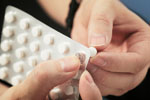People with FH may be able to avoid early onset of cardiovascular disease by reducing their LDL cholesterol levels.
It is important to start reducing LDL cholesterol as soon as possible as cardiovascular disease can be slowed, stopped or even reversed.
This can be done by following a healthy lifestyle along with taking medication.
There is no cure for FH so life-long treatment is required.
TREATMENT – MEDICATION
A healthy lifestyle is very important but alone, almost never reduces LDL cholesterol to target level.
Management of FH therefore includes medication in addition to a healthy lifestyle.
The three current medication options for reducing LDL cholesterol are:
Statins
- have been shown to reduce the risk of heart attacks and death from heart attacks.
- are very effective at lowering LDL cholesterol (‘bad’ cholesterol) and also lower triglycerides (blood fats) and raise HDL cholesterol (‘good’ cholesterol) a small amount.
- work in the liver by blocking the action of an enzyme, HMG-CoA reductase, which the body uses to make cholesterol; thus lowering the amount of LDL cholesterol circulating in the blood.
- increase the number of LDL receptors which increases LDL cholesterol uptake by the liver; thus lowering the amount of LDL cholesterol circulating in the blood.
- also:
- stabilises plaques (turning them from ‘crispy’ to ‘rubbery’, decreasing the risk of plaque breaking off and blocking an artery)
- improves endothelial function (makes the lining of the arteries work better)
- reduces inflammation (inflammation plays a major role in the formation of atherosclerosis)
- reduces damage done to cells through oxidation (neutralises molecules that cause damage to the artery walls)
- reduces blood clot formation (clots may block an artery).
- can reduce LDL cholesterol by up to 60%.
- side effects can include muscle pain, liver damage, tiredness and intestinal problems. Memory loss and diabetes have also been reported.
- muscle pain and tiredness respond well to supplementing the diet with co-enzyme Q10, fish oils or vitamin D.
- avoid St John’s wort (a herb used for the treatment of depression) and grapefruit/juice while taking statins as there may be possible interactions.
- examples – Atorvastatin, Simvastatin, Pravastatin, Rosuvastatin and Fluvastatin
-
See FAQs : ‘I have seen a lot of negatives things about statins. Are they necessary, are they safe? ‘
Cholesterol absorption inhibitors
- work in the intestinal wall to reduce cholesterol absorption from the intestine into the blood.
- reduces LDL cholesterol by up to 15%.
- can be combined with a statin to achieve further reductions in LDL cholesterol or used on its own by people who can’t take a statin.
- side effects can include stomach pain, fatigue and muscle soreness.
- a statin and Ezetimibe are available in a combined single tablet.
- example – Ezetimibe
Bile acid binding resins
- work in the intestines where it binds to bile acids (made from cholesterol and aids in the digestion of dietary fats) and then is excreted through the bowel instead of being reabsorbed back into the blood. To make more bile acids, the body needs more cholesterol. This process reduces the levels of LDL cholesterol in the blood.
- reduces LDL cholesterol by up to 20% at tolerable doses.
- use is limited by gastrointestinal side effects e.g. upset stomach, constipation, bloating, nausea and gas.
- can interference with the absorption of various other medications.
- can be used in combination with statins.
- are powders which are mixed with a liquid and consumed prior to/with a meal. Some are premixed.
- examples – Cholestyramine, Colestipol and Colesevelam
Other medications that may be added to help control FH include fibrates, nicotinic acid and fish oils.
New treatments for FH include:
- PCSK9 inhibitors
- ANGPTL3 inhibitors
 LDL cholesterol target
LDL cholesterol target
LDL cholesterol target (will vary for each patient):
- at least 50% reduction in LDL cholesterol
- or LDL cholesterol less than 2.5 mmol/l if there is no cardiovascular disease present
- or LDL cholesterol less than 1.8 mmol/l if there is cardiovascular disease present
- or LDL cholesterol resulting from maximally tolerated dose of statin plus ezetimibe
Cholesterol levels will be checked regularly to ensure the treatments are working.
Lipoprotein apheresis
Lipoprotein apheresis is a treatment, similar to dialysis for renal patients, to reduce the LDL cholesterol (and occasionally Lp(a)) in the blood.
During lipoprotein apheresis, the plasma portion of the blood, which contains the LDL cholesterol, is separated and run through a machine that removes the LDL cholesterol. The treated blood is then returned to the patient.
Lipoprotein apheresis is used for compound heterozygous FH, homozygous FH and heterozygous FH patients who do not respond to standard treatments or cannot take lipid lowering drugs due to side effects.
As the liver continuously produces LDL cholesterol, the procedure must be repeated every week/fortnight to keep the LDL cholesterol within acceptable limits. The procedure takes 2-4 hours.
It is an expensive procedure which limits its use to severe cases.
The advice in this website does not replace advice from your GP or healthcare provider.
